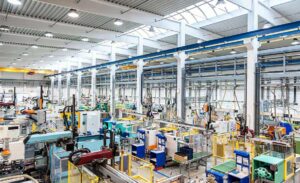Call for Business Experiments – Support for SMEs in the Implementation of HPC Solutions
We draw your attention to the second open call under the FFplus project, which focuses on supporting small and medium-sized enterprises (SMEs) in addressing specific business challenges through High Performance Computing (HPC). The aim of the call is to carry out so-called “business experiments” designed to demonstrate that the use of HPC technologies can solve real-world problems and have a positive impact on business.
These experiments should demonstrate the benefits of HPC for the broader SME ecosystem in Europe and showcase concrete success stories that can inspire other businesses to adopt advanced computational technologies. The call is particularly suitable for companies that have not yet had experience with HPC but are facing a technical or business challenge that could be addressed through the use of HPC.
Key Information about the Call:
- Proposal submission deadline: August 26, 2025 at 17:00 (Brussels time)
- Expected duration of experiments: maximum 15 months, planned start date: January 1, 2026
- Total call budget: €4 million
- Proposal language: English
- Submission method: exclusively electronic, in accordance with the requirements set out in the document. Announcement and Proposer’s Guide
The call is open to SMEs from countries associated with the Digital Europe Programme. Please note that the eligibility condition was updated on July 18, 2025 – the decisive factor for determining eligibility is the status of a country’s association as of the call deadline (August 26, 2025).
Key points to address in the proposal:
- Identify the business challenge and describe how HPC can address it.
- Present the expected benefits and positive impact on the business.
- Define the specific objectives, partners, and resources required for the implementation of the experiment.
- Address data protection aspects, budget, and implementation plan.
- Commit to creating a case study on the impacts of the experiment.
Each proposal must be prepared in accordance with the structure outlined in the Proposer’s Guide. The use of the official proposal templates (Part A and Part B) is mandatory.
Are you interested in participating but not sure where to start?
Do not hesitate to contact us. We will be happy to provide you with a consultation on the call, help you understand the conditions, verify the eligibility of your project, and connect you with suitable partners or research institutions. We can also assist you in preparing your proposal and provide feedback on its quality before submission.
Our ambition is to support Slovak SMEs in entering the digital space and help them fully leverage the potential of HPC. Working with us can simplify the entire process and increase your chances of success in the call.
Contact us and take part in an initiative that can significantly advance your business.
 BeeGFS in Practice — Parallel File Systems for HPC, AI and Data-Intensive Workloads 6 Feb - This webinar introduces BeeGFS, a leading parallel file system designed to support demanding HPC, AI, and data-intensive workloads. Experts from ThinkParQ will explain how parallel file systems work, how BeeGFS is architected, and how it is used in practice across academic, research, and industrial environments.
BeeGFS in Practice — Parallel File Systems for HPC, AI and Data-Intensive Workloads 6 Feb - This webinar introduces BeeGFS, a leading parallel file system designed to support demanding HPC, AI, and data-intensive workloads. Experts from ThinkParQ will explain how parallel file systems work, how BeeGFS is architected, and how it is used in practice across academic, research, and industrial environments. When a production line knows what will happen in 10 minutes 5 Feb - Every disruption on a production line creates stress. Machines stop, people wait, production slows down, and decisions must be made under pressure. In the food industry—especially in the production of filled pasta products, where the process follows a strictly sequential set of technological steps—one unexpected issue at the end of the line can bring the entire production flow to a halt. But what if the production line could warn in advance that a problem will occur in a few minutes? Or help decide, already during a shift, whether it still makes sense to plan packaging later the same day? These were exactly the questions that stood at the beginning of a research collaboration that brought together industrial data, artificial intelligence, and supercomputing power.
When a production line knows what will happen in 10 minutes 5 Feb - Every disruption on a production line creates stress. Machines stop, people wait, production slows down, and decisions must be made under pressure. In the food industry—especially in the production of filled pasta products, where the process follows a strictly sequential set of technological steps—one unexpected issue at the end of the line can bring the entire production flow to a halt. But what if the production line could warn in advance that a problem will occur in a few minutes? Or help decide, already during a shift, whether it still makes sense to plan packaging later the same day? These were exactly the questions that stood at the beginning of a research collaboration that brought together industrial data, artificial intelligence, and supercomputing power. Who Owns AI Inside an Organisation? — Operational Responsibility 5 Feb - This webinar focuses on how organisations can define clear operational responsibility and ownership of AI systems in a proportionate and workable way. Drawing on hands-on experience in data protection, AI governance, and compliance, Petra Fernandes will explore governance approaches that work in practice for both SMEs and larger organisations. The session will highlight internal processes that help organisations stay in control of their AI systems over time, without creating unnecessary administrative burden.
Who Owns AI Inside an Organisation? — Operational Responsibility 5 Feb - This webinar focuses on how organisations can define clear operational responsibility and ownership of AI systems in a proportionate and workable way. Drawing on hands-on experience in data protection, AI governance, and compliance, Petra Fernandes will explore governance approaches that work in practice for both SMEs and larger organisations. The session will highlight internal processes that help organisations stay in control of their AI systems over time, without creating unnecessary administrative burden.

